Some days in the life of a Siberian Cyclist (Surviving Siberia – Entering Japan)
Friday, December 17th, 2004KM cycled: 5,200
KM to home: 19, 800 (approx.)
Lowest Temperature: -40 Degrees Centigrade
Current Location: Wakkanai (small seaport on Japan’s northern island of Hokkaido)
Awakening an hour before dawn to the sound of a digital alarm clock located in the layer between my 2 wooly hats, I remember where I am. A thousand kilometers from the nearest city, and (besides my fellow Siberian cyclist, Al) probably over 50 km from the nearest human being. Our tent sits in an icicle shrouded forest, half way across a vast glacial valley which stretches and winds its way westwards to the plains of Yakutia.
Every breath exhaled instantly crystallizes – beard, sleeping bag, tent roof – all is covered in ice. We stumble from the tent, gasping our way drunkenly through the bitter dawn to check the thermometer strapped to my handlebars. We are elated and awed to discover the temperature has now dropped right down toĦĦminus 40 Degrees (Centigrade and Fahrenheit in fact converge at this point).
_0001.jpg)
As we left the Gulag port of Magadan in September – the first leg of our 25,000 km bicycle ride from Siberia to England, we were repeatedly warned that cycling the `road of bones` in winter would be impossible (this is the same road which Ewan Mcgregor motorbiked 6 months ago – we ran into several people who had met him along the way). However, whilst the going was certainly hard, we came to agree with what Dostoevsky wrote after his stint in a Tsarist camp in the 1800s: that one of the defining characteristics of human kind is our ‘ability to adapt’. It is astonishing how we did adjust to the cold. Yes, we wore a few more clothes, and ate twice as much food as normal, but in terms of actually feeling the cold, things were not nearly so bad as I’d imagined.
Whilst the human body does learn to cope, our human gadgets do not. Plastic in particular dislikes the cold: bicycle pumps snap, petrol stoves refuse to light, and tent poles will not click together. After a long days cycling, such fiddly extra repair jobs resulted in what Al describes as ‘serious sense of humour failures’ (i.e. normally involves shouting loudly at the offending item).
After a frenzy of cooking, eating and packing, we are on the road, the secret of staying warm being to always keep moving. The sun shines bright and cold on the sharp, mountains as we push over another pass and across another valley. The roads are covered in well packed snow, but there are few cars – the last vehicle we saw was a demilitarized tank on caterpillar treads, ferrying around the local goldminers.
As evening approaches, we are relieved to spot light and thus human life through the trees. The thought of standing in a warm room is irresistible and the Russians prove themselves wonderful hosts. Usually merely introducing ourselves as Englishmen cycling to Japan is enough to earn us several square meals and a warm bed. Whether such hospitality is just because foreigners (and cyclists) are so rare in these parts, or whether the cold climate ingrains such a culture, I do not know. But this is not reluctant or ostentatious hospitality – rather, it is lavish and full of smiles, whether it be gold miners, coal miners, weather station operators, factory workers, cafe owners or families.
Having broken through the notorious Gulag covered mountains of Kolyma, we began to realize how seriously behind schedule we were. We had used up half of our visas 90 day allowance, and yet were still only a quarter of the way to our Russian exit point where we could catch a ferry to Japan. Each day we slipped further and further behind schedule, and in our darkest moments we began to think that making it on time would prove impossible. This called for drastic action: we calculated a minimum daily distance and braced ourselves to stick to it, through thick and thin. What follows is a blur of rising before dawn in order to fight our way through blinding blizzards, along icy roads, across forested valleys, and then on and on into the cold nights before we could finally snatch a few hours of desperate sleep on a warm cafe floor.
Besides the cold and fatigue, feelings of guilt also started to get me down, as Al, three years the fitter than me (he has just traversed Europe, Africa and all the Americas on a bike) was able to go at a much faster pace and was continually forced to wait for me to catch up. By carrying some of my gear, he was able to help me to go faster, and we tried desperately to be positive about the situation.
At one stage during the exertion, I collapsed feverishly into a free hostel bed to sleep for 14 hours. Any notions that I would have been among Stalin’s survivors shattered – I too would have fallen if I’d been sent to work in the Gulags. A day later we were back on the bikes, an even higher daily km average now required.
.jpg)
After many days of relentless effort, things began to look more optimistic. We had covered a lot of distance southwards, and were finally out of the mountains and heading back east to the coast. However… at just this point when we thought we were through the most difficult partĦĦtwo unfortunate events arose before us, one of them deeply tragic.
The first took the form of a white car with a fake Nevada number plate and only one front headlight. It stood obstinately blocking the road one night as we approached a town and the three young men who met us were drunk, but hardly frightening. It was only when they showed us their gun that their demand for money suddenly became serious. We felt we had been robbed by amateur hoodlums as we stomped angrily into the town half an hour (they had relieved me of the contents of my wallet).
Even such a mild experience was enough to poison my imagination. Suddenly I saw a potential thief in every waiting car and in every unlit street (most streets in Russia are unlit).With the help of Al`s determined and optimistic view of humanity, after a couple of days I began to trust and smile at strangers again, even as I prayed through gritted teeth for those who had deemed themselves our enemies.
Just a few nights later came a far greater tragedy – fire. We were being kindly put up in a single room cottage by a lovely couple who were delighted and enthusiastic about their brand new roadside cafe?. That night they treated us to tasty meal on the house, which we ate with them around the table, along with their helper, a friendly but quiet middle aged man from Uzbekistan. Six hours later, at 3am, I was awoken by the sound of screams. Looking out of the window, I beheld a sight which is now forever imprinted on my memory. Half of the beautiful new cafe was consumed in roaring flames, ripping through wood and spraying shouts of smoke into the night sky. Al and I ran outside to find the owners standing wailing on the road. The husband had barely escaped with his life, his clothes in shreds. Nightmarishly, the man from Uzbekistan was still inside. Al bravely considered running into the ferocious flames, but at that very moment a huge gas explosion ripped through what remained of the burning shell, destroying any hope of rescue.
The next morning, having given the police statements for the second time in a week, we climbed sorrowfully back onto our bikes. It felt wrong to pedal onwards, leaving the desperate grieving behind us. Every pedal took us further away. Our quest for adventure and our race against the visas was suddenly void of meaning.
We pushed east, towards the coast, faster than ever. Much of the time our road ran alongside the romantic Trans-Siberian railway, its huge 100 carriage freight trains clattering past us, tooting their whistles merrily. And then finally, suddenly, we were breaching our last barrier – a swirling and blizzardy range of coastline mountains, out of which we descended to catch a glimmering hope filled sight of the port of Vanino.
From here, a ferry took us across the sea to the oil rich island of Sakhalin, which lies just north of Japan, where we recuperated for a few days under the kind hospitality of an old school friend Alexis Fletcher… and then, before we knew it, we were wheeling the bikes into Russia’s final bureaucratic obstacle – passport control. The passport official scrutanised my photo and face unusually carefully and then let me through with a serious nod. A few minutes later, as we headed for the ferry, Al and I chuckled as we realized that we had accidentally got our passports mixed up with one another… we had raced our bodies to the limit in order to stay within the strict parameters of our visa, all so that an official could let us out of the country with the wrong passport!!
I suppose this illustrates one of the most ridiculous and frustrating aspects of the New Russia – the Russia which still has not shaken off some of the most dehumanizing aspects of the Soviet Union – the desire of officialdom to drown and control people through power, fear and paperwork. With the old regime gone, fear and power have become the playthings of the ubiquitous mafia, whilst the paperwork mega-machine continues to exist – incompetent and stubborn and determined to stifle all creativity and enterprise. Several people we met expressed that they believe it will take two whole generations before Russia will be free from this haunting past
Finally, I must emphasise how grateful I am towards all the wonderful Russian people who helped us on our way through the last 5000 cold and difficult kilometers. I am profoundly challenged by such kindness – can I ever learn to be so generous myself?
…and now suddenly, a quick 5 hour ferry journey later, here we are in Japan, enjoying the hospitality of some big hearted Catholic nuns, and the extraordinary comfort of Japanese hot tubs (as opposed to 2 showers a month if we were lucky in Siberia) and electronically warmed toilet seats (as opposed to a minus 35 outdoor squat loo!!). Over dinner on our first night, my head swirls as the conversation breaks between French, English and Japanese, and all the while I keep beginning my sentences in Russian. It may take a few days to get used to it, but I think Japan is going to be fun!!
Many, many thanks to all those people who have supported me so far with wonderful encouraging emails and prayers. Also, for all the amazingly generous contributions to work of Viva Network – I’ve now just passed the 1000 pound mark on my effort to raise 10,000. One of the big reasons I’m doing this ride is to help the really amazing work which Viva Network do for street children and children at risk around the world… please do spare a thought for them if you are wanting to give to a charity this Christmas.
www.justgiving.com/cyclinghomefromsiberia (you can give very quickly online at this site, and it will automatically do gift aid for you too… you can also see how much I’ve raised so far)
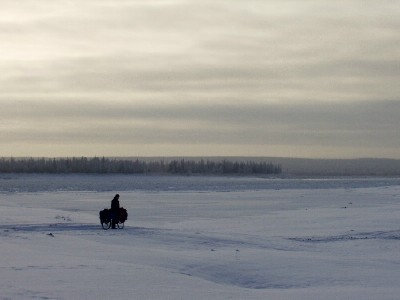
Crossing the Aldan River in the Yakutia Province
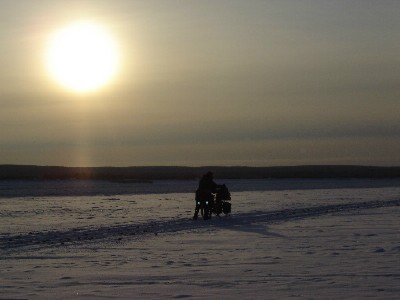
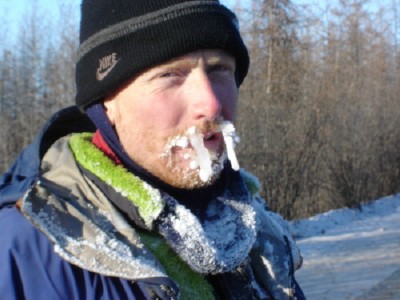
Al needs to invest in a handerchief!
.jpg)
Al – are you having fun yet??
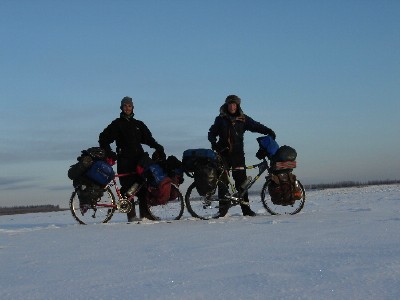
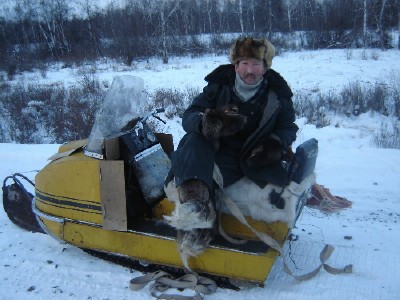
Bicycles are not the only way of crossing the River at this time of year!
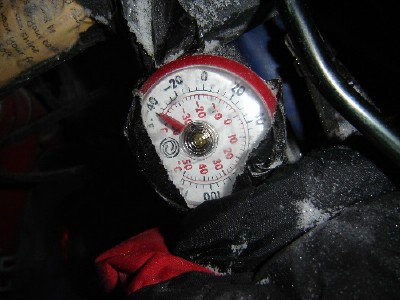
– 40 Degrees, as low as our thermometer goes!

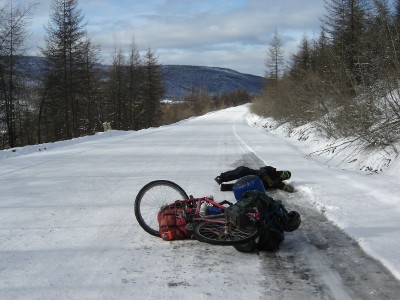
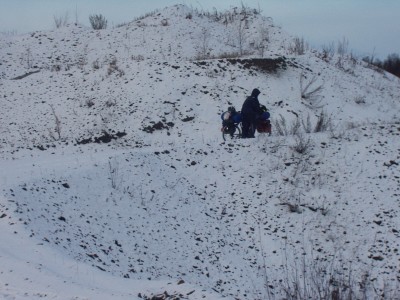
.jpg)